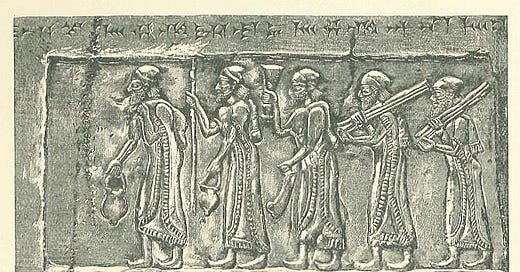What Does the Bible Really Say About Sexuality? Part 1: The Forbidden Fruit.
Teasing out fact from fiction regarding biblical sexuality
A lot of people wonder about the Bible and sex. According to Pew Research, 80% of Americans are self-professed Christians who believe in God, as described in the Bible. Needless to say, a lot of people have a lot of questions about the nature of religion and sex.
But there’s a dark side to that.
In recent decades, religion once again has become a weapon of oppression, frequently wielded in the exercise of oppressing women and minority groups with a newfound fervor.
Anti-LGBTQ sentiment is alive and well in the United States, and just last year, we saw right-wing extremists on the Supreme Court and in statehouses across America engage in what can only be described as an all-out assault on women’s rights.
Yet, for a book that’s so often used as the basis for our most consequential decisions, few people actually read it, and even fewer understand what it says. Those who do, need to rely on translators, and they’re totally at the mercy of their respective biases.
That’s why I felt it was important to analyze the texts themselves in the wider context of what we know about ancient sexuality in order to analyze it with the knowledge of all of my years of study on the subject of sexuality itself. I also know a good amount of Greek, at least enough to read Greek texts, so I’m able to go straight to the source in a way many people can’t.
With that, and prioritizing sex above any particular system of beliefs, I can present to you an honest appraisal of what the Bible says—and does not say—about sex.
Η γλώσσα της Βίβλου—The Language of the Bible
It’s no secret that people twist the Bible’s words with their own interpretations that often conveniently coincide with their personal or political ambitions. Americans regularly ignore the commandments to take care of the poor and castigate LGBTQ folks with the verse in Leviticus that says that gay men should be killed.
They justify doing so because they don’t speak the original language and are forced to rely on translations. Unable to access the original texts, they shrug and pick from all the interpretations the ones they like best. I’m not going to do that here. 1
I’ll state clearly what is up for interpretation, what’s inarguably clear in the Bible, as well as which metaphorical euphemisms are supported by evidence. If we find the same phrase elsewhere in the Bible in the same context, that’s a hint that it was a common euphemism for sex in those days.
Now, let’s talk about sex in the Bible.
Background: Sex and the Ancients
Sex in the ancient world was very different than it is today.
Today, we tend to view the ancient Greeks, Romans, and Israelis as being very different groups with different customs. But the cultures weren't as far apart as we assume. Greek, Hebrew, Roman and most cultures around the ancient Mediterranean adhered to similarly strict sexual codes, especially pertaining to oral sex.
As I discussed in my history of oral sex in the ancient world, the mouth was considered sacred, and defiling it by using it as a sexual instrument was socially ruinous. This is true of all three ancient cultures.
The Roman poet Catullus is probably my favorite example of this. Whenever he’d get pissed at someone, he’d vent his anger at them in his poetry. He was particularly fond of the Latin word irrumo, which means to fuck someone in the mouth. As the penetrator, it was a threat of epic proportions.
The Ancients were obsessed with sexual hierarchies. Today, we’re more concerned with the sexual identities and orientations of the people involved in sex. In the ancient world, they were more concerned with social status and explicitly defined rank. Today, we care more about the sexual activity itself(anal, oral, BDSM, etc.), but the ancients cared more about the giver-receiver relationship.
The receiver was always considered feminine regardless of their sex. This was enough to give you a bad reputation, which just goes to show you how the ancients felt about women. Thank the gods times have changed!
Sexy, Sexy Bible
This anti-oral-sex, socially-hierarchical attitude was also evident in Judaism, where cunnilingus was considered among the most grievous sins and socially ruinous. Cunnilingus may have been so ruinous that it was the catalyst of the Christian fall, which we’ll get to soon.
Sex is written on page after page in the Christian and Hebrew Bibles, a book that often considers women property. It’s no surprise then that cunnilingus would be so frowned upon. And though fellatio was okay according to the Ancient Jews because it respected the sexual hierarchy of man above woman, by the Middle Ages, Christianity met it with open hostility.
In the 900s CE, Burchard writes:
Have you tasted your husband’s semen in order to make his love for you burn greater through your diabolical deeds? If you have, you should do seven years of penance on the appointed fast days.
The Bible is full of sex, and most people don’t know it. It’s either couched in the inaccessible, archaic English of the King James Bible or, in the newer version, much of its meaning lost in translation—literally.
Keep reading with a 7-day free trial
Subscribe to The Science of Sex to keep reading this post and get 7 days of free access to the full post archives.





